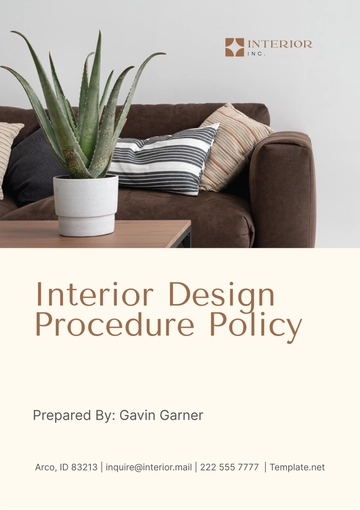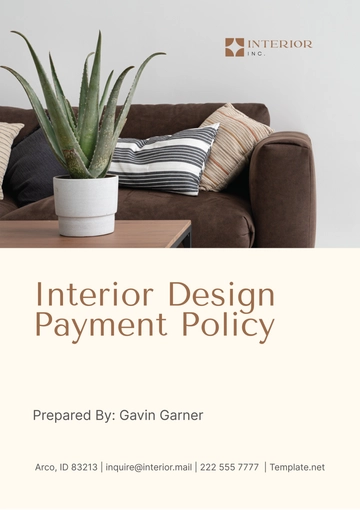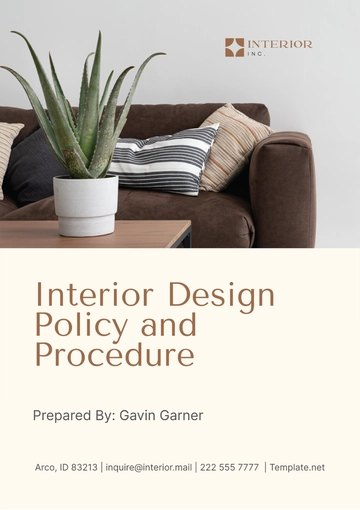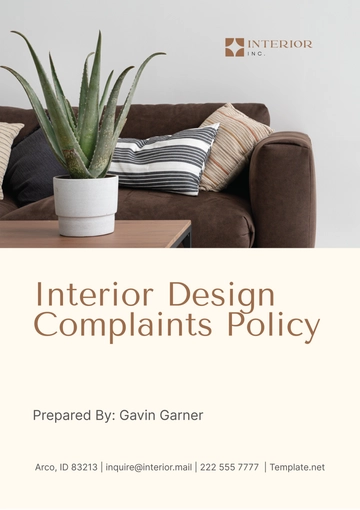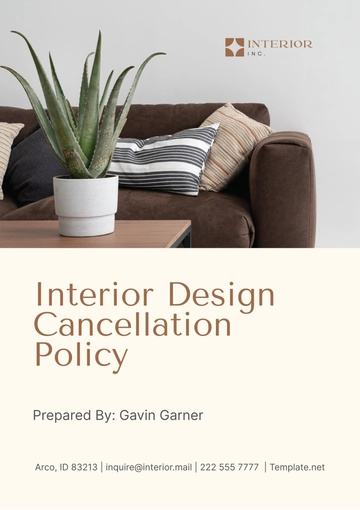Free Interior Design Payment Policy
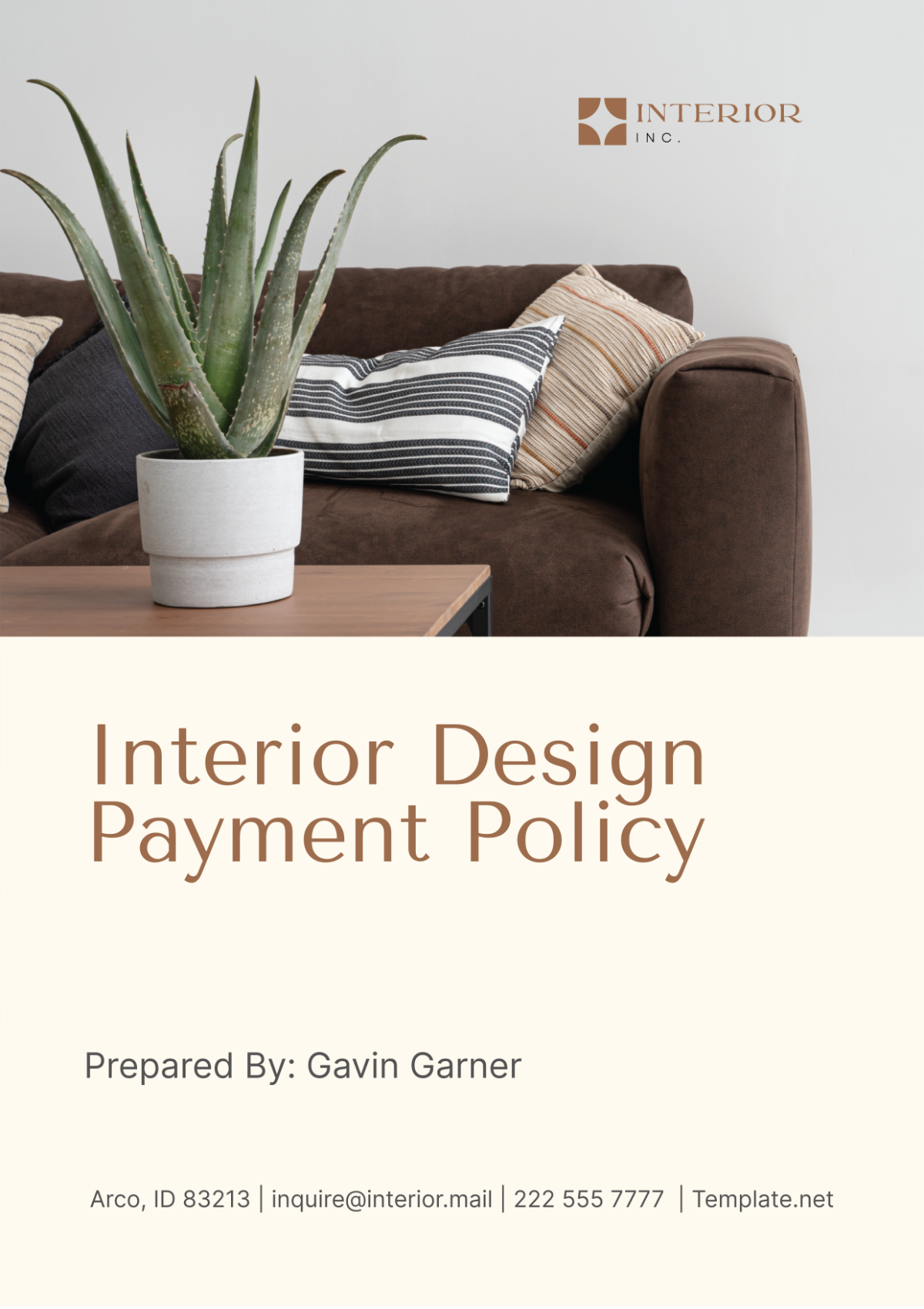
Effective Date: January 1, 2050
1. Purpose
This Interior Design Payment Policy is established to delineate clear, consistent guidelines and procedures for managing financial transactions associated with the services offered by [YOUR COMPANY NAME]. The primary goal of this policy is to ensure all payments are processed timely and efficiently, facilitating a seamless operational flow, and upholding strong, transparent relationships with our clients and vendors. Through this policy, we aim to promote trust, prevent financial discrepancies, and ensure a mutual understanding of payment responsibilities which are essential for maintaining excellent client satisfaction and operational efficiency.
2. Scope
This policy applies comprehensively to all clients engaging with the interior design services provided by [YOUR COMPANY NAME] and to all internal staff members responsible for processing and managing these payments. It encompasses all financial transactions related to project fees, deposits, and other charges that occur in the course of delivering our design services. This ensures that all stakeholders involved in the financial processes are aware of and operate under the same set of guidelines.
3. Payment Terms
3.1 Initial Deposit
A non-refundable initial deposit of 50% of the total estimated project cost is required to commence any project. This deposit is crucial as it secures the allocation of resources and the scheduling of our design team to begin work on the project. The initiation of a project is marked by the signing of the contract and the formal project kickoff meeting, which will be scheduled at a mutually convenient time for both [YOUR COMPANY NAME] and the client.
3.2 Progress Payments
The structure of progress payments is designed to match the milestones of each project, which will be clearly outlined in the initial contract. These payments are determined based on the duration, complexity, and resource requirements of the project. Failing to meet scheduled progress payments may result in a temporary halt or delay in the project, as ongoing work is contingent upon the agreed financial commitment. To avoid misunderstandings, each payment milestone will be clearly communicated and documented in the project timeline provided at the start of the engagement.
3.3 Final Payment
The final payment is due upon project completion but must be settled before the final walk-through with the client. This payment triggers the release of all finalized designs and related documents to the client. Project completion is defined by the full implementation of the design plan, the conclusion of all decor installations, and the client’s final approval of the completed work. This final step is crucial as it ensures that the client is satisfied with the outcome and that [YOUR COMPANY NAME] fulfills its commitment to delivering high-quality design services.
3.4 Late Payment
If payments are more than 15 days overdue, a late fee of 2% per month on the outstanding amount will be incurred. To ensure fairness and prevent excessive accumulation of fees, a cap will be placed on the total late fee, not to exceed 50% of the original invoice amount. This policy is intended to encourage timely payments while recognizing that clients may occasionally face unforeseen delays.
4. Payment Methods
Payments can be made using several convenient methods: bank transfer, credit card, or check. [YOUR COMPANY NAME] will provide detailed instructions for each payment method in the contract and via our payment service department. Specific information regarding any fees associated with different payment methods, particularly for credit card transactions, will also be included to help clients make informed decisions about their preferred payment method. This transparency is part of our commitment to maintaining clear and straightforward financial dealings with all clients.
5. Refunds and Cancellations
Refund requests and cancellations are sensitive areas that require clear guidelines to protect both the client and the company. Refund requests must be submitted in writing and will be evaluated on a case-by-case basis. Cancellations made more than 30 days before the projected start date of the project may be eligible for a partial refund of the initial deposit. The specific refundable amount will depend on the expenses already incurred by [YOUR COMPANY NAME] at the time of cancellation. For instance, cancelling 60 days prior may result in a 75% refund of the deposit, while cancelling 30 days prior may result in a 50% refund. Conditions under which refunds are not available, such as specific non-refundable expenses already incurred, will also be clearly outlined to ensure all parties have a mutual understanding from the outset.
6. Modifications to the Policy
[YOUR COMPANY NAME] reserves the right to modify this payment policy at any time to adapt to new financial strategies, operational needs, or changes in legal requirements. These modifications ensure that our practices remain current with industry standards and compliant with applicable laws.
6.1 Implementation of Changes
All changes will be effective no sooner than 30 days after they are announced. This grace period allows clients to become acquainted with any adjustments in the payment structure or policy terms.
6.2 Notification of Changes
Clients will be notified of any policy changes through direct emails sent to the address provided at the time of signing the service contract. In addition, updates will be clearly posted on our website and communicated during any ongoing project meetings. This ensures that all clients, regardless of their project stage, are well informed and can plan accordingly.
6.3 Transition Rules
For ongoing contracts that might be affected by policy updates, specific transition rules will be outlined. These rules are intended to ensure that no client is unfairly disadvantaged by changes, particularly those who have entered into agreements under previous policy terms.
7. Contact Details
For any inquiries or concerns regarding our payment policy, or if clients require assistance with their payment arrangements, our dedicated team is ready to provide support. Clients are encouraged to reach out through the following means:
7.1 Payment Service Department
Clients can contact our payment service department directly via email at [YOUR COMPANY EMAIL]. This team is equipped to handle all payment-related inquiries and provide detailed explanations or clarifications as needed.
7.2 Customer Support Line
For immediate assistance, clients may also call our customer support line. This contact information, including hours of operation, will be provided in the contract and on our website. Our customer support staff are trained to address payment issues promptly and efficiently, ensuring client satisfaction.
7.3 Physical Address
Clients who prefer in-person discussions or need to handle sensitive payment issues can visit our office. The address and hours for in-person visits are available on our website and by request through any communication channel.
8. Documentation and Records
Maintaining accurate and comprehensive records of all payment transactions is a cornerstone of our financial policy. This practice not only supports financial integrity but also ensures transparency for both [YOUR COMPANY NAME] and our clients.
8.1 Access to Records
Clients can request copies of their payment records at any time. These requests should be directed to the payment service department, and will be fulfilled within a reasonable timeframe, ensuring clients have access to their financial history with [YOUR COMPANY NAME].
8.2 Record Retention
All payment records are kept securely for a minimum period as required by law, ensuring that both historical data and recent transactions are readily available for review or auditing purposes.
9. Legal Compliance
[YOUR COMPANY NAME] commits to upholding the highest standards of legal compliance in all its financial transactions. This commitment protects our clients and our business by ensuring all payment practices adhere strictly to applicable laws and regulations related to consumer protection and financial transactions.
9.1 Regular Audits
Regular audits are conducted to ensure our payment processes remain compliant with legal standards. These audits help identify and rectify any discrepancies or inefficiencies in our payment operations.
9.2 Compliance Training
All staff involved in payment processing receive ongoing training on relevant laws and best practices. This training is crucial for maintaining our high standards of compliance and service.
10. Dispute Resolution
In the event of a dispute related to payments, [YOUR COMPANY NAME] has established a formal procedure to ensure fair and timely resolution.
10.1 Steps for Resolution
Clients are encouraged to first contact our payment service department to discuss any disputed charges. If the issue cannot be resolved at this level, it may be escalated to a mediation process.
10.2 Mediation and Legal Recourse
If mediation does not resolve the dispute, clients may have recourse to legal action. The terms for such proceedings will be clearly outlined in the contract to ensure both parties understand their rights and obligations.
- 100% Customizable, free editor
- Access 1 Million+ Templates, photo’s & graphics
- Download or share as a template
- Click and replace photos, graphics, text, backgrounds
- Resize, crop, AI write & more
- Access advanced editor
Secure seamless transactions and foster trust with Template.net's Interior Design Payment Policy Template. Crafted for clarity and professionalism, this template outlines your payment procedures with precision, ensuring transparency and reliability for clients and stakeholders. Customize effortlessly using our AI editor tool, tailoring the policy to suit your specific needs and preferences. Set the standard for financial integrity with Template.net's expertly crafted solutions.
You may also like
- HR Policy
- Restaurant Policy
- Company Policy
- Accounting Policies and Procedures
- Website Policy
- Privacy Policy
- Safety Policy
- School Policy
- IT and Software Policy
- Law Firm Policy
- Construction Policy
- Interior Design Policy
- Travel Agency Policy
- Education Academic Policy
- Security Policy
- Real Estate Policy
- Expense Policy
- Software Policy







